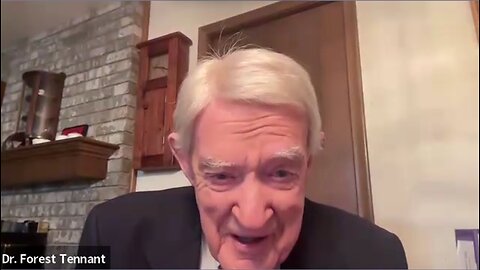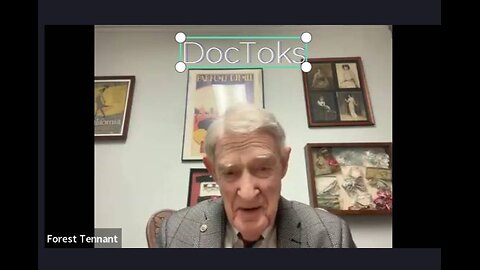
DocToks Season 6
16 videos
Updated 3 days ago
Doctoks Season 6
-
S6E15: NY26 | Advancing the Standard of Care for Multi-System Diseases | With Guest Host Pat Irving.
 DocToks with Dr. Forest Tennant & FriendsJaime welcomed attendees to Doc Talks Season 6, Episode 15 and introduced Dr. Tennant to lead the discussion, which began with casual conversation about personal health updates and global peace initiatives. The main discussion focused on chronic pain treatment challenges, including the role of autoimmunity in diseases like systemic lupus erythematosus and adhesive arachnoiditis, as well as the importance of recognizing and addressing multi-system diseases. The conversation ended with a review of recent pain management forum outcomes, where participants discussed regulatory challenges and the need for continued advocacy at state board levels to improve treatment access and guidelines.51 views 1 comment
DocToks with Dr. Forest Tennant & FriendsJaime welcomed attendees to Doc Talks Season 6, Episode 15 and introduced Dr. Tennant to lead the discussion, which began with casual conversation about personal health updates and global peace initiatives. The main discussion focused on chronic pain treatment challenges, including the role of autoimmunity in diseases like systemic lupus erythematosus and adhesive arachnoiditis, as well as the importance of recognizing and addressing multi-system diseases. The conversation ended with a review of recent pain management forum outcomes, where participants discussed regulatory challenges and the need for continued advocacy at state board levels to improve treatment access and guidelines.51 views 1 comment -
S6E14: Doctoks Christmas Special! Healing and Hope: Addressing Chronic Pain with Protocol and Faith.
 DocToks with Dr. Forest Tennant & FriendsThe meeting focused on a Christmas special episode of Doc Talks, featuring Dr. Forrest Tennant and various medical professionals discussing treatments for adhesive arachnoiditis and chronic pain conditions. Dr. Tennant shared his medical protocol for treating adhesive arachnoiditis, emphasizing the importance of treating both pain and the underlying condition simultaneously. Tracy Brehm, a patient who had been diagnosed with adhesive arachnoiditis, shared her personal journey of recovery and the treatments that helped her improve her quality of life. The panel also discussed the definition and implementation of palliative care for chronic pain patients, highlighting the need for better recognition and access to appropriate treatments.83 views 4 comments
DocToks with Dr. Forest Tennant & FriendsThe meeting focused on a Christmas special episode of Doc Talks, featuring Dr. Forrest Tennant and various medical professionals discussing treatments for adhesive arachnoiditis and chronic pain conditions. Dr. Tennant shared his medical protocol for treating adhesive arachnoiditis, emphasizing the importance of treating both pain and the underlying condition simultaneously. Tracy Brehm, a patient who had been diagnosed with adhesive arachnoiditis, shared her personal journey of recovery and the treatments that helped her improve her quality of life. The panel also discussed the definition and implementation of palliative care for chronic pain patients, highlighting the need for better recognition and access to appropriate treatments.83 views 4 comments -
S6E13: Beyond the Diagnosis: Finding Hope and Faith in the Intractable Pain Journey.
 DocToks with Dr. Forest Tennant & FriendsThe meeting focused on the challenges faced by patients with chronic pain and the complexities of managing their conditions. Dr. Tennant discussed the need for coordinated care plans and emphasized that pain clinics should not be expected to treat underlying diseases. He highlighted the importance of using opioids effectively during pain flares and introduced the concept of adhesive arachnoiditis as an inflammatory autoimmune disease. Alison shared her positive experience with ivermectin treatment, while Donna delivered a Christmas message of hope and faith. Dr. Ibsen reported on recent developments in pain management advocacy and regulatory issues in California. The conversation ended with a discussion of potential future challenges in accessing pain medications and the importance of preparing for shortages.76 views
DocToks with Dr. Forest Tennant & FriendsThe meeting focused on the challenges faced by patients with chronic pain and the complexities of managing their conditions. Dr. Tennant discussed the need for coordinated care plans and emphasized that pain clinics should not be expected to treat underlying diseases. He highlighted the importance of using opioids effectively during pain flares and introduced the concept of adhesive arachnoiditis as an inflammatory autoimmune disease. Alison shared her positive experience with ivermectin treatment, while Donna delivered a Christmas message of hope and faith. Dr. Ibsen reported on recent developments in pain management advocacy and regulatory issues in California. The conversation ended with a discussion of potential future challenges in accessing pain medications and the importance of preparing for shortages.76 views -
S6E12: We Need Legislative Change in Pain Care Access! | Bob Sheerin- APDF
 DocToks with Dr. Forest Tennant & FriendsThe meeting focused on pain management strategies, with Dr. Tennant explaining the biological basis of pain and recommending short-acting opioids as the most effective treatment option. Bob discussed his organization's work supporting children with chronic illnesses and veterans, highlighting challenges in accessing medical care and the need for legislative changes to improve trust between patients and healthcare providers. The group explored various opioid medications and pain management approaches, emphasizing the importance of individualized treatment and addressing the broader issues of medication shortages and policy constraints affecting patient care.57 views
DocToks with Dr. Forest Tennant & FriendsThe meeting focused on pain management strategies, with Dr. Tennant explaining the biological basis of pain and recommending short-acting opioids as the most effective treatment option. Bob discussed his organization's work supporting children with chronic illnesses and veterans, highlighting challenges in accessing medical care and the need for legislative changes to improve trust between patients and healthcare providers. The group explored various opioid medications and pain management approaches, emphasizing the importance of individualized treatment and addressing the broader issues of medication shortages and policy constraints affecting patient care.57 views -
S6E11: A Thankful Special with Exciting News!
 DocToks with Dr. Forest Tennant & FriendsThis week was an amazing show! This was a special "Giving Thanks" episode featuring Dr. Forest Tennant, Michael Seidel l (a patient with arachnoiditis), Pat Irving, and Monty Goddard (medical board advocates). The meeting covered several key topics related to pain management alternatives, successful treatment protocols, and advocacy efforts with medical boards. Tune in for more!101 views 1 comment
DocToks with Dr. Forest Tennant & FriendsThis week was an amazing show! This was a special "Giving Thanks" episode featuring Dr. Forest Tennant, Michael Seidel l (a patient with arachnoiditis), Pat Irving, and Monty Goddard (medical board advocates). The meeting covered several key topics related to pain management alternatives, successful treatment protocols, and advocacy efforts with medical boards. Tune in for more!101 views 1 comment -
S6E10: Warning Signs Prior to Adhesive Arachnoiditis | Will Purdue's $7.4B Cause HARM?
 DocToks with Dr. Forest Tennant & FriendsDr. Tennant introduced the concept of a "precursor period" or "prologue period" in adhesive arachnoiditis development, where symptoms appear before formal diagnosis is possible. The Purdue Pharma opioid settlement was finalized for $7.4 billion, with Dr. Guess noting this sets a concerning legal precedent. Dr. Tennant emphasized that adhesive arachnoiditis is a chronic inflammatory disease requiring ongoing treatment beyond pain management. Epstein-Barr virus was discussed as a propagator (not originator) of inflammation in adhesive arachnoiditis. Ivermectin treatment for Epstein-Barr reactivation was reported as effective by Allison, showing improvements in both cognitive and physical symptoms. Recent anti-opioid claims about tramadol ineffectiveness and opioids causing cancer were refuted by Dr. Tennant and Dr. Guess.87 views 1 comment
DocToks with Dr. Forest Tennant & FriendsDr. Tennant introduced the concept of a "precursor period" or "prologue period" in adhesive arachnoiditis development, where symptoms appear before formal diagnosis is possible. The Purdue Pharma opioid settlement was finalized for $7.4 billion, with Dr. Guess noting this sets a concerning legal precedent. Dr. Tennant emphasized that adhesive arachnoiditis is a chronic inflammatory disease requiring ongoing treatment beyond pain management. Epstein-Barr virus was discussed as a propagator (not originator) of inflammation in adhesive arachnoiditis. Ivermectin treatment for Epstein-Barr reactivation was reported as effective by Allison, showing improvements in both cognitive and physical symptoms. Recent anti-opioid claims about tramadol ineffectiveness and opioids causing cancer were refuted by Dr. Tennant and Dr. Guess.87 views 1 comment -
S6E9: Controlling the Reactivated Virus | Hormones & Pain | Melissa W.'s Journey with CRPS and a SCI
 DocToks with Dr. Forest Tennant & FriendsDr. Tennant discussed the link between Epstein-Barr virus reactivation and adhesive arachnoiditis, emphasizing the importance of testing and treatment Melissa Wardlaw shared her journey with CRPS and spinal cord injury, highlighting how hormone replacement therapy significantly improved her condition The panel discussed the fraudulent use of terms like "central sensitization" and "hyperalgesia" to deny pain treatment Hormones (progesterone, estrogen, testosterone) play a crucial role in healing spinal cord injuries and managing pain A multimodal approach to pain management is most effective, including addressing general health, mental health, and using appropriate medications60 views 2 comments
DocToks with Dr. Forest Tennant & FriendsDr. Tennant discussed the link between Epstein-Barr virus reactivation and adhesive arachnoiditis, emphasizing the importance of testing and treatment Melissa Wardlaw shared her journey with CRPS and spinal cord injury, highlighting how hormone replacement therapy significantly improved her condition The panel discussed the fraudulent use of terms like "central sensitization" and "hyperalgesia" to deny pain treatment Hormones (progesterone, estrogen, testosterone) play a crucial role in healing spinal cord injuries and managing pain A multimodal approach to pain management is most effective, including addressing general health, mental health, and using appropriate medications60 views 2 comments -
S6E8: Pain Care Chronicles | Advocacy | Legal Challenges | Innovated Treatments
 DocToks with Dr. Forest Tennant & FriendsDr. Tennant discussed the importance of hormones in pain management, highlighting their role in tissue regeneration, immune function, and pain relief Pat Irwin provided updates on advocacy efforts in Washington state regarding medical board rules and opioid prescribing Monty shared news about an upcoming forum on December 17th at California State University, Sacramento, addressing patient care and prescription challenges Dr. Ibsen gave updates on his ongoing legal cases with medical boards The group discussed Dr. Anand's recent incarceration and plans to support him59 views 1 comment
DocToks with Dr. Forest Tennant & FriendsDr. Tennant discussed the importance of hormones in pain management, highlighting their role in tissue regeneration, immune function, and pain relief Pat Irwin provided updates on advocacy efforts in Washington state regarding medical board rules and opioid prescribing Monty shared news about an upcoming forum on December 17th at California State University, Sacramento, addressing patient care and prescription challenges Dr. Ibsen gave updates on his ongoing legal cases with medical boards The group discussed Dr. Anand's recent incarceration and plans to support him59 views 1 comment -
S6E7: A New Contender for ACUTE Pain? | Julie's Substack: "My Probably Not-So-Rare Disease"
 DocToks with Dr. Forest Tennant & FriendsS6E7: Does Relief have a New Contender? | Julie: "My Probably Not-So-Rare Disease" Dr. Tennant introduced Journavx (suzetrigine), a new non-opioid pain medication approved FOR ACUTE PAIN that shows promise for adhesive arachnoiditis, CRPS, and EDS patients Julie Titone presented her article "My Probably Not-So-Rare Disease" challenging the classification of adhesive arachnoiditis as rare. Arachnoiditis Hope has developed five treatment protocols now available on their website: Arachnoiditishope.com. Topics include general treatment, spinal fluid leakage, pain flares, emergency treatment after procedures, and Epstein-Barr virus reactivation Dr. Guess discusses supply chain issues for pain medications remain critical, with no improvement over the past 3-4 years despite DEA attempts to address shortages. Tune in for more!80 views
DocToks with Dr. Forest Tennant & FriendsS6E7: Does Relief have a New Contender? | Julie: "My Probably Not-So-Rare Disease" Dr. Tennant introduced Journavx (suzetrigine), a new non-opioid pain medication approved FOR ACUTE PAIN that shows promise for adhesive arachnoiditis, CRPS, and EDS patients Julie Titone presented her article "My Probably Not-So-Rare Disease" challenging the classification of adhesive arachnoiditis as rare. Arachnoiditis Hope has developed five treatment protocols now available on their website: Arachnoiditishope.com. Topics include general treatment, spinal fluid leakage, pain flares, emergency treatment after procedures, and Epstein-Barr virus reactivation Dr. Guess discusses supply chain issues for pain medications remain critical, with no improvement over the past 3-4 years despite DEA attempts to address shortages. Tune in for more!80 views -
S6E6: Arachnoiditis Inflammation | Meaningful Connections | Modern-Day Miracles!
 DocToks with Dr. Forest Tennant & FriendsInflammation is the root cause of adhesive arachnoiditis and must be treated alongside pain symptoms with a multi-drug approach. Two cornerstone medications for treating spinal canal inflammation are methylprednisolone (Medrol) or dexamethasone, and ketorolac (Toradol), recommended 1-3 days per week at low doses. Glutathione, a tripeptide antioxidant, shows promise as an anti-inflammatory supplement with minimal side effects. Pain clinics typically treat symptoms rather than underlying diseases, requiring patients to take responsibility for their disease management. Dr. Ibsen faces federal investigation after treating 80 pain refugees, highlighting the ongoing persecution of physicians who treat chronic pain patients. An anti-inflammatory diet rich in fruits and vegetables, while avoiding sugar surges, supports inflammation control. Epstein-Barr virus testing and treatment are recommended for all patients with adhesive arachnoiditis.78 views
DocToks with Dr. Forest Tennant & FriendsInflammation is the root cause of adhesive arachnoiditis and must be treated alongside pain symptoms with a multi-drug approach. Two cornerstone medications for treating spinal canal inflammation are methylprednisolone (Medrol) or dexamethasone, and ketorolac (Toradol), recommended 1-3 days per week at low doses. Glutathione, a tripeptide antioxidant, shows promise as an anti-inflammatory supplement with minimal side effects. Pain clinics typically treat symptoms rather than underlying diseases, requiring patients to take responsibility for their disease management. Dr. Ibsen faces federal investigation after treating 80 pain refugees, highlighting the ongoing persecution of physicians who treat chronic pain patients. An anti-inflammatory diet rich in fruits and vegetables, while avoiding sugar surges, supports inflammation control. Epstein-Barr virus testing and treatment are recommended for all patients with adhesive arachnoiditis.78 views








